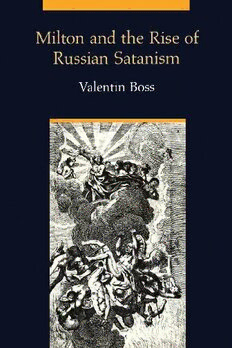
Milton and the Rise of Russian Satanism PDF
Preview Milton and the Rise of Russian Satanism
MILTON AND THE RISE OF RUSSIAN SATANISM This page intentionally left blank VALENTIN BOSS Milton and the Rise of Russian Satanism UNIVERSITY OF TORONTO PRESS Toronto Buffalo London University of Toronto Press 1991 Toronto Buffalo London Printed in Canada ISBN 0-8020-5795-0 Printed on acid-free paper Canadian Cataloguing in Publication Data Boss, Valentin Milton and the rise of Russian satanism Includes bibliographical references. ISBN 0-8020-5795-0 i. Russian poetry - History and criticism. 2. Devil in literature. 3 Milton, John, 1608-1674 - Characters - Devil. 4. Milton, John, 1608-1674 - Influence. 5. Milton, John, 1608—1674. Paradise lost. I. Title. PG3065-D4B67 1991 89i.7'i'oo9382 C9o-O95o8o-3 This book has been published with the help of a grant from the Canadian Federation for the Humanities, using funds provided by the Social Sciences and Humanities Research Council of Canada. Dedicated to my mother, Josephine Boss, nee Stapenhorst, whose early childhood prayer may have amused the Prince of Darkness: 'Will Satan mich verschlingen So lass die Englein singen: "Dies Kind soil unser Letztes [unverletzet] sein." ' 'Should Satan hold me fast Then let the little angels sing: "This child must be our last [unharmed]" ' This page intentionally left blank Contents PREFACE IX ACKNOWLEDGMENTS xiii TRANSLITERATION Xvii INTRODUCTION: THE RISE OF RUSSIAN SATANISM xix PART I The Satan of the Enlightenment i i Satan and the First Translation of Paradise Lost 3 2 Introducing Milton's Satan to the Common Reader 14 3 Monks and 'Pocket Poets': Publication 30 4 Masonic Devils and the Light Within 48 5 Satan, Pugachev, and the French Revolution 68 PART II Satan as Romantic and Marxist Idol 79 6 The Demonic Tradition from Zhukovsky to Pushkin 80 7 Milton's Satan and Lermontov 102 viii Contents 8 Banning and Reviving Satan 119 9 1917 and After: The Triumph of Milton's Satan 136 10 Satan as Anti-Imperialist 147 Conclusion: Prince of Darkness, Prince of Light 155 APPENDIXES 165 i Milton's Interest in Russia 167 ii An English Oration Concerning Milton's Satan from Lermontov's School 174 m A Chronological Distribution Table 178 ABBREVIATIONS l8l NOTES 183 BIBLIOGRAPHIC NOTE 235 BIBLIOGRAPHY 239 INDEX 255 FIGURES following 78 and 154 Preface Modern self-awareness in Russia, like modern Russian literature, stirs into life with Peter the Great, whose window into Europe - St Petersburg - transformed his country. With much else, a European devil climbed through that window. Yet the most arresting symbol of the Petrine transformation was Prometheus, whose likeness the Tsar-Reformer ordered stamped on the coinage of the realm. With that act, loaded with philosophical implications, which Andrei Sakharov and Solzhenitsyn have approached from opposing corners, Russian culture was formally introduced to the idea of progress. The unpredictable consequences of that encounter are still with us today. The traditional Orthodox view of good and evil, which had the virtue of clarity, gave way to the secular Western one in which Prometheus and the Devil take turns at playing the same role. This confusing ambiguity, itself the offspring of revolution, was captured in much of its modern pathos by Paradise Lost, England's first global classic. Milton's Satan, interpreted in so many ways at various times, is tied historically to Christianity as well as to the new world forged during the Renaissance. Since the nineteenth century he has most often been portrayed as one who expresses both the indomitable revolutionary will of the Puritans and the incorrigible individualism of the capitalist order they helped bring into being. More recent psychological or structuralist interpretations have not chal- lenged the historical fact that, whatever gloss innovative critics have chosen to give Milton's work, he is by common consent the first in European litera- ture to rid the Devil of the folkloric attributes that, until Paradise Lost, marred the intellectual gravity of Satan's posture as the adversary of God and man. The life of Milton's Satan in Russia proved to be almost as startling as his
